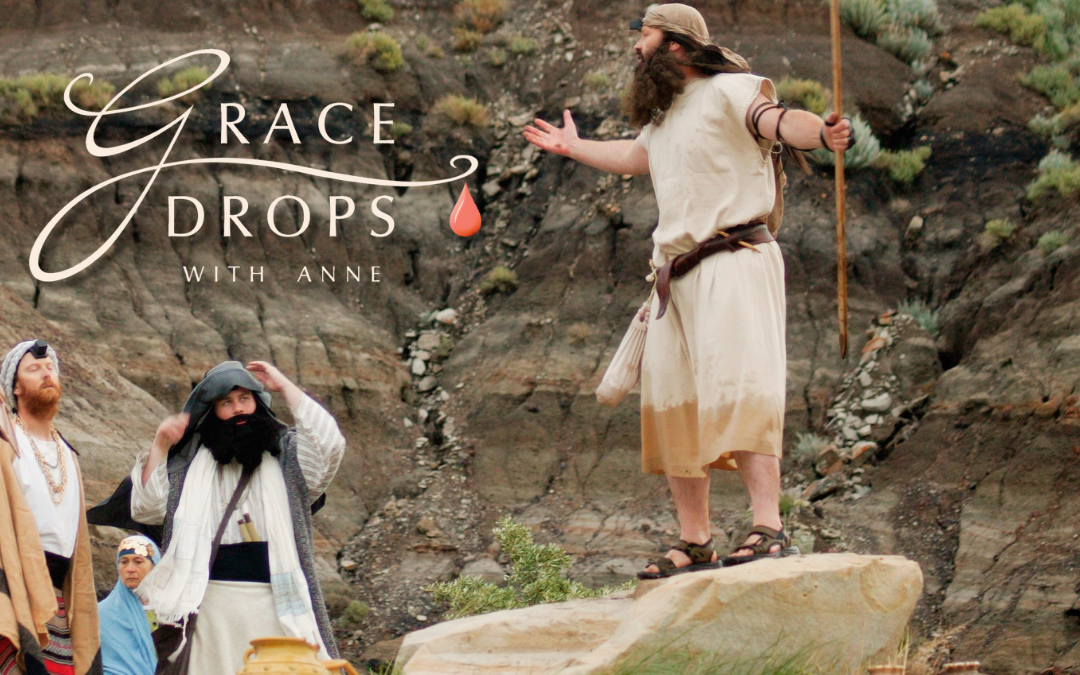This post includes a model prayer.
I’ve met several people across the years who have told me that they’ve received a prophecy indicating they carry Elijah’s mantle. After studying the life of Elijah for some time, I felt prompted to comment to the last few people who have mentioned such a prophecy: ‘So that means, does it, that you were once on fire for the Lord but for the last twenty years or so you haven’t done anything much?’
People are surprised I knew. But I didn’t. I just surmised that it was likely they’d made the common mistake of using a biblical hero as a role model, instead of understanding that Jesus wants us to finish the work they left undone and mend the wounds they inflicted on history.
It stuns me, every time I read about Elijah or listen to a story that features him, how preachers and teachers take so much of what he said at face value. They don’t compare his words with the standing Scriptural record. They don’t notice the issues and therefore they don’t realise how marvellously Jesus mends them. They assume Elijah’s perception is valid when, in fact, it’s deeply problematic.
Let’s examine some of the issues:
- Elijah three times says he’s the only prophet left, once at Mount Carmel, twice at Horeb. This is not only flat out incorrect, he knows it to be so—he’s been told by Obadiah about a hundred prophets sheltering in caves and, as we read on past Elijah’s encounter with the still, small voice of God, we discover several of these prophets both advising and challenging the king.
- Elijah never completes the task God gave him to anoint Jehu and Hazael as kings. Some commentators say that Scripture says he did, but I’m at a loss to know where they find this. It’s clear from a comment Jehu makes to his chariot driver Bidkar that he’d overheard a prophecy of Elijah delivered to Ahab—indicating that Elijah had met up with Jehu but had not taken the opportunity to anoint him.
- Elijah is given a breakfast by an angel when he has fled from Jezebel. In the strength of that divine food, he travels forty days to Horeb. The widespread assumption is that the purpose of the food was to sustain him for the journey. However, based on the similarity of this scene with that of the only other breakfast of bread baked on hot coals in Scripture—that of Simon Peter running from his calling—we can see the food was to sustain him to go back, not to keep fleeing.
- Elijah was tasked with changing the government of Samaria by ridding the land of the prophets of Baal and Asherah. He should have ushered the hundred prophets hidden by Obadiah out of the caves into influential royal positions and sent out faithful bands of seventy people across the country to bring the nation back to Yahweh. We know this is what God intended because of what Jesus later did in sending out a band of seventy disciples through Samaria. Instead Elijah allowed a power vacuum to develop and eventually be filled by another four hundred pagan prophets. Then he was given a second chance to change the government by anointing Jehu but there is no explicit mention of that happening, until Elisha arranged for it two or three decades later.
- Elijah calls down fire from heaven to consume two groups of fifty soldiers headed up by disrespectful commanders. Sure these troops may have reaped what they’d sown if they were worshippers of Moloch, but can we assume this is a proper response to dishonour when Jesus told James and John in a similar place and similar circumstances to just move on?
When we examine the latter part of Elijah’s life, we see delay in obedience, at least a decade of procrastination, and a failure to comply with God’s known will. And when we see Simon Peter inheriting Elijah’s mantle, passed to him by Jesus at a lakeside in Galilee, we realise that part of Elijah’s assignment was to open up a knowledge of Yahweh to the Gentiles. The regime change he was meant to inaugurate was not only to bring light to the people of Samaria who were living in the darkness of Moloch worship, but to the Gentiles as well. The new governments in the neighbouring nations of Samaria and Aram were meant to prevent war and bring a promise of peace across the region—perhaps even push aside the rise of Assyria.
However, because of the fear he succumbed to as a result of Jezebel’s death threat, Elijah ultimately deferred his obedience for so long it became defiance. He rebelled against God. And as Samuel once told Saul, rebellion is as the sin of witchcraft.
Elijah’s fear of Jezebel and long-term failure to trust God had opened him up to the very thing he was assigned to bring down. He’d focussed on her and the spiritual forces behind her instead of looking to God. He’d become like his enemy. His enemy had indeed become himself.
No wonder, when Jehoshaphat asks to consult a prophet of Yahweh, Ahab says there’s only one—but does not name Elijah.
So, with this in mind, what are the issues in your faithline if your inheritance in the Lord flows from Elijah?
Just as for a bloodline cleansing, repentance and forgiveness are essential. If Elijah’s mantle has passed down to you as an inheritance in the family of faith, then the same applies. Bear in mind it’s gone through Elisha’s hands, as well as those of Jonah and John the Baptiser and Simon Peter. It has an unfinished assignment attached to it.
What aspects of forgiveness and repentance need to be accomplished? What defilements are over the mantle that need cleansing by Jesus?
Rebellion and witchcraft, delay, procrastination, defiance, knowing God’s will and refusing to accept or enact it, discrimination and prejudice, dishonour, fearing God less than he feared the enemy and, in fact, fearing the enemy so much that he became like her. This is what Elijah needs to be forgiven for; and this is what we—whether we have been granted Elijah’s mantle in this era or not—need to repent of in ourselves.

Heavenly Father, I forgive Elijah for both enacting and role-modelling rebellion, witchcraft, delay, procrastination, defiance of Your will, discrimination, prejudice, dishonour, failure to prevent war as You wanted, rejecting his assignment to tell outsiders about You, fearing You less than the enemy and focussing on the enemy so much that he became the enemy. I ask Jesus to empower these words of forgiveness I have spoken and to cleanse the mantle so that I may advance the mission towards completion, with Your help turning the hearts of fathers to their children and the hearts of children towards fathers.
Heavenly Father, I ask Your forgiveness for taking on those ungodly aspects of Elijah that are mixed in with his immense courage, his colossal boldness, his strength of endurance, his zeal and his passion to honour and serve You. I repent of rebellion, witchcraft, delay, procrastination, defiance of Your will, discrimination, prejudice, dishonour, failure to prevent war as You wanted, rejecting my assignment to tell outsiders about You, fearing You less than the enemy and focussing on the enemy so much that I became the enemy. I ask Jesus through the power of His blood to give life to my words of repentance and cause them to accomplish the turnaround You want in my life.
In Your great mercy, forgive me for ever wanting to be like Elijah instead of wanting to be like Jesus. But more than like Him, make me one in the fullness of covenant with Yeshua HaMashiach, Jesus the Messiah. In His name and through the power of His Cross. Amen and amen.

For more on Elijah’s mantle, see Dealing with Lilith: Spirit of Dispossession or The Elijah Tapestry. Please get in touch through the contact form at Armour Books if you are in the US, UK or Australia and there are availability/price issues at the retailer.


I’m in tears praying and receiving the Lord’s forgiveness…
Thank you so much and the Lord continue to bless you according to His perfect will for you ❤️
Thank you for helping me find a different way to look at scripture. I will do more research.